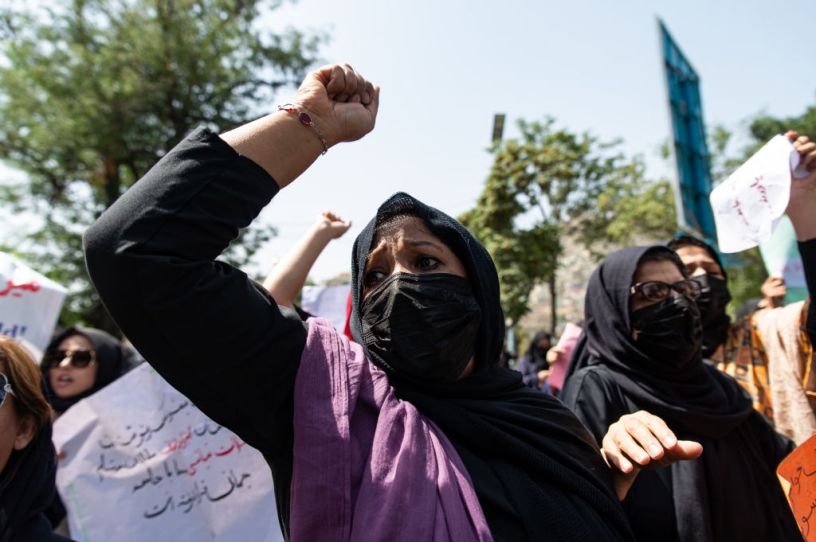The Taliban’s Gender Apartheid Regime

After enduring a quarter century of revolution, occupation, and civil war, the people of Afghanistan began laying the foundations for nationhood two decades ago. The return of the Taliban to power in August 2021 ended all of the progress that had been made. Now the country is falling into sectarian conflict, magnified by the turmoil of economic freefall, natural disasters, and public health crises.
It has turned into one of the world’s biggest human rights crises over the course of just 13 months, and Afghan women have borne the brunt of the Taliban’s tyranny.
While the Taliban has issued very few decrees to cope with dire challenges like poverty, staggering unemployment, and other issues, there have been a thread of 34 decrees rolling back the rights of women and girls.
More than a year ago, on September 17, the Taliban reopened high school for boys but not female students. Despite describing the exclusion as a temporary measure, the Taliban has yet to take steps toward a nationwide, systematic return of girls to school.
Last March, the Taliban issued a decree requiring women to cover themselves when out in public—a full burka is suggested but any hijab that covers women’s hair and most of their body is acceptable. Punishments for violating the decree will be inflicted on male family members, incentivizing relatives to police one another. Such orders are part of a broader effort by the Taliban to block girls’ access to secondary education, push women out of most areas of employment, restrict women’s freedom of movement, obstruct women’s access to health care, and abolish the system designed to protect women and girls from violence. Just last week, a suicide bomber killed at least 38 people, mostly girls and women, at an education center serving the Hazara ethnic minority. No one claimed responsibility, but the Hazaras have been targeted by ISIS in recent years. The Taliban has been reluctant to use resources to protect them, increasing the death toll in such attacks. The Taliban’s actions amount to gender apartheid.
The weaponization of gender apartheid as a theocratic totalitarian cudgel should come as no surprise given the Taliban’s track record from 1996 to 2001. What is surprising, however, is the speed and efficiency with which the Taliban has moved. Today, Afghan women across the world feel abandoned by the international community, that their voices are unheard, and that their demands are neglected in discussions and policies impacting the future of their country.
In March, the Security Council gave the United Nations Assistance Mission in Afghanistan (UNAMA) one of the strongest human rights and gender equality mandates in the world. The mandate’s first crucial agenda was to protect women by mainstreaming gender as a cross-cutting issue through conducting monitoring and reporting on the human rights situation on the ground. But six months after the mandate’s adoption, there has been little to no progress in upholding quality of life or individual freedoms for Afghans. In fact, for Afghan women and girls, we’ve witnessed a vivid regression in rights over the last 12 months, amounting to the world’s biggest human rights crises.
The international community has done little to stem the effects of the Taliban policies. There is an alarming pattern of women taking their lives out of hopelessness and despair, the ultimate indicator of how bad the situation is for Afghan women and girls. Death is seen as preferable to living in today’s Afghanistan under the Taliban.
Women are the ones who stand to lose the most if the world normalizes the Taliban’s reign. Amid efforts to systematically silence the voices of women in Afghanistan, surveys provide some insight into what impacts their daily lives the most and what the world can do to help.
Drawing on the input of more than 3,000 women in 70 percent of Afghanistan’s provinces, an Afghan-led research entity (Bishnaw) and various U.N. entities operating in Afghanistan found that, despite the dire humanitarian conditions on the ground facing Afghan women, their rights continued to be their most important priority. Moreover, even without an active Taliban insurgency, women feel more insecure now than ever before. Virtually all of the women consulted felt that the lack of attacks by the Taliban does not equate to security for women and girls. As one participant from Baghlan put it, “When there is unemployment, poverty, and the school doors are closed for girls, this is called lack of security.”
The survey participants also emphasized the importance of restoring institutions created in the republic era to end violence against women. The disappearance of the specialized courts, designated defense lawyers, and civil society organizations offering shelters that had been developed over two decades is creating a fertile environment for the perpetuation of gender-based violence.
There are steps that the international community can take to stem the suffering Afghan women are experiencing under Taliban rule, including maintaining sanctions on the Taliban and conditioning any negotiations on the full recognition of the rights of women and girls. Perhaps the most effective would be a formal declaration that the Taliban is practicing gender apartheid. This designation was a catalyst for change in South Africa and can be in Afghanistan.
There is plenty the United Nations can do besides issue statements and hold consultations on women’s rights, namely keeping all Taliban leaders on the U.N. blacklist, refusing to seat its representative at the United Nations Assembly, and reinstating a total travel ban on Taliban officials.
One of the top priorities for women surveyed by Bishnaw is to facilitate communication between women and the Taliban. Women need a platform for such dialogue, and there should be a diversified space that represents the real Afghanistan.
Doing too little on behalf of Afghan women is a tacit acknowledgement that Afghan women’s rights are indeed an effective bargaining chip for the Taliban and will only exacerbate the world’s greatest human rights crisis.